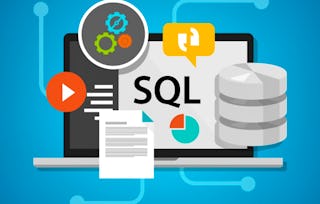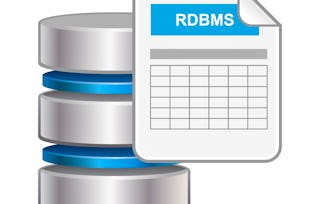Ce cours est une introduction à l'utilisation des bases de données relationnelles dans l'analyse commerciale. Vous apprendrez comment fonctionnent les bases de données relationnelles et comment utiliser les diagrammes entité-relation pour afficher la structure des données qu'elles contiennent. Ces connaissances vous aideront à comprendre comment les données doivent être collectées dans les contextes professionnels et à identifier les caractéristiques à prendre en compte si vous êtes impliqué dans la mise en œuvre de nouveaux efforts de collecte de données. Vous apprendrez également à exécuter les requêtes et les instructions d'agrégation de tables les plus utiles pour les analystes commerciaux, et vous vous entraînerez à les utiliser avec des bases de données réelles. A la fin de ce cours, vous aurez une compréhension claire du fonctionnement des bases de données relationnelles et disposerez d'un portefeuille de requêtes que vous pourrez présenter à des employeurs potentiels. Les entreprises collectent de plus en plus d'informations dans l'espoir que ces données leur apporteront de nouvelles perspectives d'amélioration. Les analystes qui savent comment accéder à ces données - c'est-à-dire vous ! - disposeront d'un solide avantage concurrentiel dans ce monde des affaires où les données sont omniprésentes.

Gérer les Big Data avec MySQL

Gérer les Big Data avec MySQL
Ce cours fait partie de Spécialisation D'Excel à MySQL : Techniques d'analyse pour l'entreprise


Instructeurs : Daniel Egger
192 621 déjà inscrits
Inclus avec
4,085 reviews
Compétences que vous acquerrez
- Catégorie : Analyse de valeur et de rentabilité
- Catégorie : Informatique décisionnelle
- Catégorie : Modélisation des données
- Catégorie : Conception de la base de données
- Catégorie : Big Data
- Catégorie : Bases de données
- Catégorie : Bases de données relationnelles
- Catégorie : MySQL
- Catégorie : Analyse des Données
- Catégorie : SQL
Détails à connaître

Ajouter à votre profil LinkedIn
5 devoirs
Découvrez comment les employés des entreprises prestigieuses maîtrisent des compétences recherchées

Élaborez votre expertise du sujet
- Apprenez de nouveaux concepts auprès d'experts du secteur
- Acquérez une compréhension de base d'un sujet ou d'un outil
- Développez des compétences professionnelles avec des projets pratiques
- Obtenez un certificat professionnel partageable

Il y a 6 modules dans ce cours
La spécialisation Coursera, " Gestion des Big données avec MySQL ", porte sur l'interaction entre le " Big data " et les entreprises, et sur la façon d'utiliser l'analytique des données pour créer de la valeur pour les entreprises. Cette spécialisation se compose de quatre cours et d'un projet Capstone final, où vous appliquerez vos compétences à un processus commercial du monde réel. Vous apprendrez à exécuter des fonctions sophistiquées d'analyse de données en utilisant des outils logiciels puissants tels que Microsoft Excel, Tableau et MySQL. Pour en savoir plus sur la spécialisation, veuillez consulter la première leçon ci-dessous, " Introduction à la spécialisation " : Excel à MySQL : Techniques analytiques pour l'entreprise" Dans le quatrième cours de cette spécialisation, "Gestion des données Big data avec MySQL", vous apprendrez comment fonctionnent les bases de données relationnelles et comment elles sont utilisées dans l'analyse d'entreprise. À la fin de ce cours, vous aurez une compréhension claire du fonctionnement des bases de données relationnelles et disposerez d'un portefeuille de requêtes que vous pourrez montrer à des employeurs potentiels. Les entreprises collectent de plus en plus d'informations dans l'espoir que ces données permettent d'obtenir de nouvelles informations sur la manière d'améliorer les activités. Les analystes qui savent comment accéder à ces données - c'est-à-dire vous ! - bénéficieront d'un avantage concurrentiel important dans ce monde des affaires où les données sont omniprésentes. Pour démarrer ce cours, vous pouvez commencer par "Introduction à la gestion des Big data avec MySQL" Veuillez prendre le temps non seulement de regarder les vidéos, mais aussi de lire l'aperçu du cours, car il contient des informations extrêmement importantes sur le cours.
Inclus
3 vidéos6 lectures
Dans ce module, vous apprendrez comment les bases de données relationnelles sont organisées et vous vous entraînerez à créer et à interpréter des diagrammes de relations d'entités (ER) et des schémas relationnels qui décrivent la structure des données stockées dans une base de données. Les exercices de cette semaine sont tirés d'un manuel bien connu sur les systèmes de bases de données et vous aideront à approfondir et à renforcer votre compréhension de l'organisation des bases de données relationnelles. Cette compréhension approfondie vous aidera à naviguer dans des bases de données commerciales complexes et vous permettra d'écrire des requêtes plus efficaces. À la fin de la semaine, vous testerez votre compréhension des principes de conception des bases de données en répondant au quiz noté de la semaine 1. Pour commencer, visionnez la vidéo "Problèmes liés à l'utilisation d'un grand nombre de données par un grand nombre de personnes" Comme toujours, si vous avez des questions, posez-les dans les Discussions. J'espère que vous apprécierez le matériel de cette semaine !
Inclus
9 vidéos6 lectures1 devoir
Dans ce module, vous commencerez à interagir avec des bases de données commerciales. Vous écrirez des requêtes SQL qui interrogeront les données de deux entreprises réelles. L'un des ensembles de données, offert par une start-up locale de Durham, en Caroline du Nord, appelée Dognition, est une base de données MySQL contenant des tables de plus d'un million de lignes. L'autre ensemble de données que nous allons découvrir provient d'une chaîne nationale de grands magasins américains appelée Dillard's. Il s'agit d'une base de données Teradata contenant des tables de plus de cent millions de lignes. Veillez à regarder les vidéos d'instruction sur l'utilisation des interfaces de base de données que nous avons mises en place pour ce cours, et faites les exercices MySQL. À la fin de la semaine, vous testerez votre compréhension de la syntaxe SQL introduite cette semaine en complétant le quiz noté. Comme toujours, si vous avez des questions, posez-les dans les Discussions. Nous vous souhaitons beaucoup de plaisir avec le matériel de cette semaine !
Inclus
6 vidéos5 lectures2 devoirs4 laboratoires non notés
Dans ce module, nous allons apprendre la syntaxe SQL qui vous permet de segmenter vos données en catégories et segments distincts. Nous allons également apprendre à combiner des données stockées dans des tables distinctes. Assurez-vous de regarder les vidéos sur les jointures et de compléter les exercices MySQL. À la fin de la semaine, vous testerez votre compréhension de la syntaxe SQL introduite cette semaine en complétant le quiz noté. Nous vous encourageons vivement à utiliser les discussions du cours pour vous aider mutuellement à répondre à vos questions.
Inclus
6 vidéos5 lectures1 devoir5 laboratoires non notés
Dans ce module, vous vous entraînerez à intégrer la syntaxe SQL que vous avez apprise jusqu'à présent dans des requêtes qui répondent à des questions d'analyse typiques de celles que vous réaliserez en tant qu'Analyste de données. En raison de la nature extensive des requêtes que nous pratiquerons cette semaine, nous avons placé le quiz noté qui teste votre compréhension des stratégies SQL que vous pratiquerez dans son propre module à la fin de cette semaine. Assurez-vous de compléter les exercices MySQL, et nous vous encourageons fortement à utiliser les discussions du cours pour vous aider mutuellement à répondre aux questions.
Inclus
2 vidéos5 lectures4 laboratoires non notés
Ce module contient le dernier quiz noté du cours. Ce quiz a pour but d'affiner et de renforcer votre compréhension des derniers concepts importants du cours !
Inclus
1 vidéo1 lecture1 devoir
Obtenez un certificat professionnel
Ajoutez ce titre à votre profil LinkedIn, à votre curriculum vitae ou à votre CV. Partagez-le sur les médias sociaux et dans votre évaluation des performances.
Instructeurs


Offert par
En savoir plus sur Analyse des Données
 Statut : Prévisualisation
Statut : Prévisualisation Statut : Essai gratuit
Statut : Essai gratuit Statut : Essai gratuit
Statut : Essai gratuit
Pour quelles raisons les étudiants sur Coursera nous choisissent-ils pour leur carrière ?

Felipe M.

Jennifer J.

Larry W.

Chaitanya A.
Avis des étudiants
- 5 stars
78,38 %
- 4 stars
16,96 %
- 3 stars
2,74 %
- 2 stars
0,88 %
- 1 star
1,02 %
Affichage de 3 sur 4085
Révisé le 26 mai 2020
it was relatively time taking course for me but one who keeps on wins at the end.Thank You professor,duke university and coursera for providing such a wonderful course. Strongly Recommended
Révisé le 20 nov. 2016
very detailed introduction of SQL. The only thing is that there could be more videos introduce different functions instead of writing documents as materials. Other than that, it's a great class
Révisé le 30 mars 2020
Not only it teaches you how to use MySQL and Teradata in a technical perspective, it also practice the analytical mind and how you would treat a real life dataset when doing analytical work.

Ouvrez de nouvelles portes avec Coursera Plus
Accès illimité à 10,000+ cours de niveau international, projets pratiques et programmes de certification prêts à l'emploi - tous inclus dans votre abonnement.
Faites progresser votre carrière avec un diplôme en ligne
Obtenez un diplôme auprès d’universités de renommée mondiale - 100 % en ligne
Rejoignez plus de 3 400 entreprises mondiales qui ont choisi Coursera pour les affaires
Améliorez les compétences de vos employés pour exceller dans l’économie numérique
Foire Aux Questions
Non. L'achèvement d'un cours Coursera ne vous donne pas droit à un crédit académique de Duke ; par conséquent, Duke n'est pas en mesure de vous fournir un relevé de notes universitaire. Cependant, votre certificat électronique sera ajouté à votre page Accomplishments - à partir de là, vous pouvez imprimer votre certificat ou l'ajouter à votre profil LinkedIn.
Pour accéder aux supports de cours, aux devoirs et pour obtenir un certificat, vous devez acheter l'expérience de certificat lorsque vous vous inscrivez à un cours. Vous pouvez essayer un essai gratuit ou demander une aide financière. Le cours peut proposer l'option "Cours complet, pas de certificat". Cette option vous permet de consulter tous les supports de cours, de soumettre les évaluations requises et d'obtenir une note finale. Cela signifie également que vous ne pourrez pas acheter un certificat d'expérience.
Lorsque vous vous inscrivez au cours, vous avez accès à tous les cours de la spécialisation et vous obtenez un certificat lorsque vous terminez le travail. Votre certificat électronique sera ajouté à votre page Réalisations - de là, vous pouvez imprimer votre certificat ou l'ajouter à votre profil LinkedIn.
Plus de questions
Aide financière disponible,


